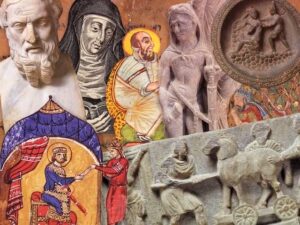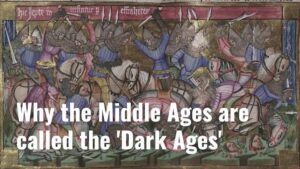INTRODUCTION
I think therefore I am: a syllable that made a groundbreaking contribution to the philosophical tradition and field of enlightenment that had breached the limits of knowledge existing during that particular time. It was like a “Mahavakya” like that of < Tatt tvam asi > which was made a new beginning- a novel growth and ravishing development in the philosophical journey of the western hemisphere of the world- a world that was guided by the crude religious scriptures of the Catholicism and traditionalism. A religious shackle that penetrated deeply within the state’s roots, it pinned all the religious inscriptions against the state’s functioning and dictates were ordained by the religious dagger. A turn that was based on the emergence of new ideas and thoughts shaped by modernism and plurality of thinking patterns.
MAIN BODY OF EXPRESSION
People weighted postulations of science, rationality and thinking heavily- their aim was to begin testing the propositions, examine the surroundings, critically analyze the subjects of knowledge, rationalize the texts and not believe in anything blindly until one has thoroughly tried, tested and examined; the principle of significance was to conclusively infer with prudential sources, trustable scientific language which is double edged sword and to believe only in the propositions which are based on scientific, logical and critical appraisal. It attempted to decimate the knowledge essentially decorated by the religious verbatim, traditional language and dawned by the godly-acts. There can be no exaggeration in saying that this was a time of change- of enlightenment and of novelty in thought, actions and speech.
This phenomenon happened primarily because of the reason that the people stopped acknowledging the pedestal which was earlier provided to the church-authorities to dictate and divulge the decree of order in the state- they outlawed the penetration of religion into the very roots of state’s working machinery and replaced it with rigorous science and demonstrative logic which was grounded in experience, empiricism and rationality.
 A text says: “Early Medieval Philosophy begins with the Patristic era which starts immediately after the death of the last Apostle John, which marked the end of the Apostolic era. The term ‘patristic philosophy’ covers all of these activities by the ‘fathers’ (patres) of the Church. The early Patrisitic philosophers are commonly referred to as the apologists because they devoted most of their attention to apologetics, a philosophical defence of the Christian faith against the claims of secular philosophy… merge rational philosophy with Christian doctrines based on faith.” However the other source expresses the following: “Addressing God, he stated, “I desire to understand in some measure thy truth, which my heart already believes. … And indeed I do believe it, for unless I believe I shall not understand.” Thus, Anselm was not trying to provide a simple-minded proof of God’s existence by “reason alone”; rather, he was seeking to draw out the implications of his existing religious belief by using his reason to make it explicit that the meaning of the word God includes the fact of God’s existence.
A text says: “Early Medieval Philosophy begins with the Patristic era which starts immediately after the death of the last Apostle John, which marked the end of the Apostolic era. The term ‘patristic philosophy’ covers all of these activities by the ‘fathers’ (patres) of the Church. The early Patrisitic philosophers are commonly referred to as the apologists because they devoted most of their attention to apologetics, a philosophical defence of the Christian faith against the claims of secular philosophy… merge rational philosophy with Christian doctrines based on faith.” However the other source expresses the following: “Addressing God, he stated, “I desire to understand in some measure thy truth, which my heart already believes. … And indeed I do believe it, for unless I believe I shall not understand.” Thus, Anselm was not trying to provide a simple-minded proof of God’s existence by “reason alone”; rather, he was seeking to draw out the implications of his existing religious belief by using his reason to make it explicit that the meaning of the word God includes the fact of God’s existence.
In other words, the first premise of the at—the meaning of the word God—is, provided by faith; the further steps of the argument are provided by reason. When reason is carefully applied to the definition of God, the word exhibits implications not found in everyday language usage. Technically, Anselm’s argument is an indirect or “reduction to absurdity” proof.” The hyper-anxiety to find god, godly traits and godliness in every argument, arena and entity, to such an extent that we end up making a pantheistic philosophy and to declare that only this ideology is correct alone was the essential characteristic feature of the “dark age of medieval period”.
CONCLUSION
Medieval philosophy is the philosophy that existed through the Middle Ages. The amnesia of being god-intoxicated was to such an extent that: “Greek philosophy ceased to be creative after Plotinus in the 3rd century CE. A century later, Christian thinkers such as St. Ambrose (339–397), St. Victorinus (died c. 304), and St. Augustine (354–430) began to assimilate Neoplatonism into Christian doctrine in order to give a rational interpretation of Christian faith. Thus, medieval philosophy was born of the confluence of Greek (and to a lesser extent of Roman) philosophy and Christianity. Plotinus’s philosophy was already deeply religious, having come under the influence of Middle Eastern religions. Medieval philosophy continued to be characterized by this religious orientation.” Philosophy, which is used to navigate a way of life during troublesome times, and help a person become a good human being, ended up being used to propel divinity and divine supremacy against everything present. It used the properties of philosophical logic which were supposed to be used for the upliftment and significant enlightenment of the human mind- the very same tools were being used for the expounding on the limits of the human mind and the character of almighty that precedes every bit of earth. The idea that, earth was the Centre of the universe was provided a prominent place in the common parlance of the society until a man dared to defy this notion and did out-of-the-box brainstorming whereby he emphatically expressed that all the planets, including earth, revolves around the sun and the idea that earth was flat was also under tight scrutiny by various rationalists. But what was the faith of such daring mastiffs of enlightenment?

RESOURCES:
https://study.com/academy/lesson/medieval-philosophy-overview-facts-middle-ages.html
https://www.encyclopedia.com/history/news-wires-white-papers-and-books/early-medieval-philosophy-emerging-dark-ages#:~:text=The%20years%20500%E2%80%931066%2C%20sometimes,circa%20810%E2%80%93circa%20877).
https://en.wikipedia.org/wiki/Medieval_philosophy
https://plato.stanford.edu/entries/medieval-philosophy/
https://www.britannica.com/topic/Western-philosophy/Medieval-philosophy



















